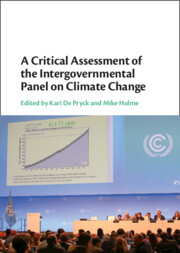Glossary
- Boundary objects
are objects that inhabit several intersecting social worlds (e.g. science and politics) and satisfy the informational requirement of these different worlds. They are plastic enough to adapt to local needs and the constraints of the several parties employing them, yet robust enough to maintain a common identity across sites (Star and Griesemer, Reference Star and Griesemer1989: 393).
- Boundary organisations
exist at the frontier of the two relatively different social worlds of politics and science, but they have distinct lines of accountability to each. They involve the participation of actors from both sides of the boundary, as well as professionals who serve a mediating role (Guston, Reference Agrawala, Broad and Guston2001: 401).
- Boundary spaces
are sites where the work of social ordering takes place in ongoing processes of negotiation, translation and accommodation (Mahony, Reference Mahony2013: 31).
- Boundary work
refers to the ideological style found in scientists’ attempts to create a public image for science by contrasting it favourably to non-scientific intellectual or technical activities (Gieryn, 1983: 781)
- Civic epistemology
refers to the institutionalised practices by which members of a given society test, affirm and deploy knowledge claims used as a basis for making collective choices. (Jasanoff, 2011: 255)
- Co-production
is used to describe how the domains of nature, facts, objectivity, reason and policy cannot be separated from those of culture, values, subjectivity, emotion and politics (Jasanoff, Reference Jasanoff2004: 3).
- Cosmopolitan knowledge
refers to diversity in how communities know and experience climate change (Jasanoff, 2012).
- Expert elicitation
is a structured approach to systematically consult experts on uncertain issues. It is most often used to quantify ranges for poorly known parameters, but may also be useful to further develop qualitative issues such as definitions, assumptions or conceptual (causal) models (Knol et al., Reference Knol, Slottje and van der Sluijs2010).
- Epistemic community
refers to a network of professionals with recognised expertise and authoritative claims to policy-relevant knowledge in a particular issue area (Haas, Reference Haas1992: 3).
- Epistemic things
are objects to be studied and worked on through the scientific process, which are characterised partly by the things not yet known and the questions they open up for study (Rheinberger, Reference Rheinberger1997).
- Generative events
have the potential to foster the disordering conditions in which reasoning is forced to ‘slow down’, creating opportunities to arouse ‘a different awareness of the problems and situations that mobilise us’ (Whatmore, Reference Whatmore2009: 588).
- Knowledge-ways
are sets of knowledge practices – ways of making and dealing with knowledge and expertise –that become stabilised within particular institutional settings (Jasanoff, Reference Jasanoff2005).
- Science–policy interfaces
are relations between scientists and policy actors that enable exchanges and co-evolution of knowledge with the aim of enriching decision-making (based on Van den Hove, Reference van den Hove2007: 807)
- Truth spots
are places that lend credibility to beliefs and claims about natural and social reality, about the past and future, and about identity and the transcendent (Gieryn, Reference Gieryn2018: overview).
- Visual
indicates a representation perceived through sight, encompassing a wide range of publishable media (videos, photographs, maps, graphs etc.).
- Weighted concepts
helps to analyse the struggles that the appearance of new objects of knowledge generate, by situating such contestation within the field of political action that these objects have the potential to shape (Hughes and Vadrot, Reference Hughes and Vadrot2019: 18).

